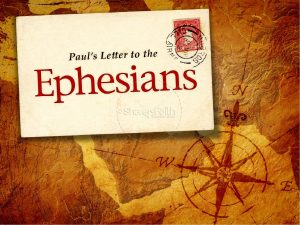
Ephesians 3:1-13
Do you know that you are being watched?
In 1984, there was a hit song, “I always feel like, somebodies watching me” by Rockwell, and as the church, this is true of us today. We as the church are being watched all the time.
In our society, we have a consumer mindset when it come to the church. The church is there for us, right? We view the church as a place where we gather to encourage, challenge, disciple and mobilize people for missions. These are all good purposes for the church, but they are not the most important function of the church.
Paul, writing to the church in Ephesus, lets them know that he has been entrusted to bring them the Gospel message by the grace of God (Ephesians 3:2).
Grace is a gift of God, and an essential key for being a follower of Jesus. We are all called to fulltime ministry in whatever role in society God has given us. But we must remember that we cannot serve the Lord in our own strength. Our very best is never good enough, we need to operate In Christ through the power of the Holy Spirit.
Serving God in your own strength will lead to burnout and disappointment.
Paul was given grace from God to proclaim the mystery that gentiles are now adopted into the family of God to share in the promises of God that were previously only for the Israelites (Ephesians 3:6). Gentiles are all people groups around the world who are not Jews (Romans 9:24-25). Aren’t you glad for the mystery?
In verse 7, Paul writes that he is a minister of the Gospel, but the Greek word also means servant. He doesn’t see being a servant as a negative thing. He sees it as an incredible privilege. Paul was humble and knew that he was not operating in his own strength (Ephesians 3:8).
To be a servant of the Lord, we cannot do what God calls us to do in our own strength. This is not just for pastors and missionaries. We all need God’s grace, because we are all called to serve the Lord in the role He has placed us in life.
If you are able to do what God calls you to do in your own strength, it might not be the call of God on your life.
The call of god on your life will always stretch you beyond your own abilities.
Verses 10 and 11 of Ephesians 3 take the mystery of the church and the call of God to a completely different level. God’s intent, from before the creation of the universe, was that the church would be used to teach the manifold wisdom of God to the rulers and authorities in the heavenly places.
Theologians agree that these “rulers and authorities”, are all spiritual beings outside of our visible realm: angels, demons, good and bad heavenly beings. The angels look on and marvel at the grace and wisdom of God (1 Peter 1:12). Demons look at the church and know that their rule on the earth is coming to an end once and for all.
We know God knows all things and that He is all wise. Wisdom is found in God. God is teaching the universe by taking people from all nations, all ethnic people groups from all backgrounds and bringing them together into one body, the church, the body of Christ.
The church is preaching a cosmic sermon to the universe.
Kent Hughes writes, “the inescapable conclusion is that the angels watch us because we are part of the mystery!… We have a far bigger and more observant audience than any of us realize!”
Never underestimate the glory of God in the church!
The church is not the teacher. God is the revealer of His wisdom, God is the teacher and we are the whiteboard. God uses the church to reveal his wisdom and glory.
The global church is so much more essential than we could ever imagine. there are cosmic realities that we know nothing about.
The church is so much more than meeting together and enjoying each-other’s company.
Getting back to the initial question; do you know that you are being watched?
Does the fact of knowing that you are being watched, change the way you think about being part of the church?
Before you decide not to be a part of a community outreach, remember, you are being watched.
Before you think about gossiping, saying some negative word about a fellow member of the church, remember you are being watched.
Before you dismiss the value of gathering-together, sleeping in rather than preparing your heart to receive from the Lord in worship and hearing His word, remember you are being watched.
This is all said as part of the mystery.
I don’t want to make you feel manipulated or guilted into coming to church rather I want to impress on you the privilege, the absolute honor we have to be used by God to declare His wisdom to the watching universe.
In these uncertain times, God’s mystery is being revealed through the church. You are part of God revealing His wisdom to the universe of heavenly powers.
Be encouraged. Lift your eyes and see the glory of God being revealed as the church gathers to worship.







